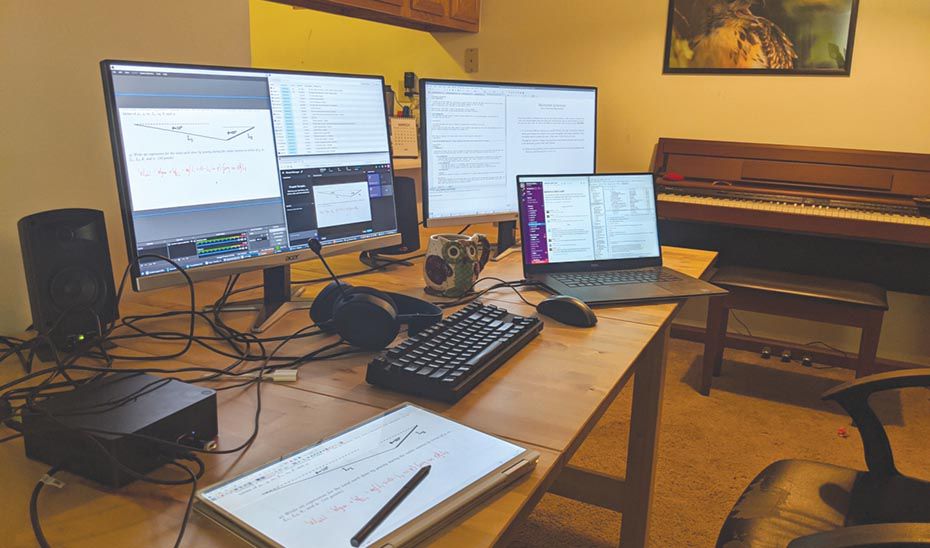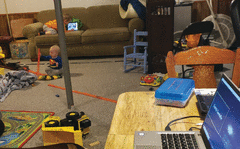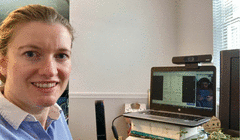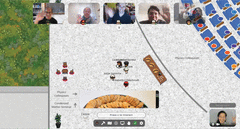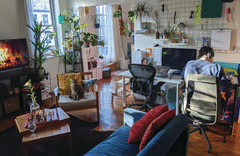“Maybe I am a failure. Maybe I don’t belong in academia. What is wrong with me?” wondered a postdoc in theoretical physics. Her research had stalled. The pandemic had her—along with much of the world—confined and isolated. The fact that she had a job and was not burdened with childcare responsibilities added to her feelings of guilt. “I was ashamed of myself for feeling depressed. I could barely get out of bed,” says the postdoc, who requested anonymity.
The virus, the isolation the pandemic requires, and decreased productivity are for many people intertwined sources of anxiety and depression. Jacqueline Baeza-Rubio is a physics major at the University of Texas at Arlington. In January she, her siblings, and her parents were sick with COVID-19; she was administering nebulizers to her parents every six hours around the clock while continuing her work on NEXT, a neutrinoless double beta decay experiment, and preparing for a new semester of coursework. Baeza-Rubio says she had depression before the pandemic and “being alone in a room all day is not good. I became paralyzed with stress and didn’t feel like working.”
The effects of the pandemic have been exacerbated by economic uncertainty and unemployment, racial unrest, political upheaval, and wildfires, tornadoes, and hurricanes, says Roxane Cohen Silver, a professor of psychological science, medicine, and public health at the University of California, Irvine. She sums up these events as “cascading collective traumas.” The effect on people varies by individual and circumstance and runs the gamut from making them short tempered to suicidal.
The impact on physicists mirrors the impact on society at large, says Daniel Lathrop, a physicist at the University of Maryland in College Park. “Without spontaneous meetings in my office and the hallway,” he says, “I feel disconnected from my peers.” Research group leaders are on the front line in counseling, he adds, for which they have no training.
For a few physicists, work has improved due to the pandemic. “The travel was a large strain on my mental health, and not having it is a huge quality-of-life enhancement,” says a professor at the University of California, San Diego. “I’m kind of dreading going back to normal.”
Even those in good circumstances feel the strain. “I have enormous privilege—a great job, the ability to work and teach remotely, a nice house to be confined to, grown kids so childcare is not an issue, and on and on,” says Yale University astrophysicist Meg Urry. “I know it’s a hundred times worse for younger scholars and parents with young children,” she adds. “Yet I’m quite worn out. I find Zoom sessions valuable but much more tiring than in-person meetings.”
Among physicists who are particularly at risk are those who are most isolated or overwhelmed by taking care of dependents and other responsibilities. Students and academics often live far from their hometown friends and families; international scholars can be especially isolated. Graduate studies and the quest for tenure are notoriously stressful even in normal times. “There is layer upon layer of things people have to deal with that contribute to mental-health issues,” says Lance Cooper, director of physics graduate studies at the University of Illinois at Urbana-Champaign (UIUC). In terms of solutions during the pandemic, he adds, “We are making it up as we go along.”
People think that theorists can do things on their computers or scribble in their notebooks, says University of Pennsylvania theoretical physics professor Andrea Liu, whose research focuses on soft and living matter. “But it’s really a social activity. We are used to interacting all day long. And the casual interactions where you talk about work with people in the office or hallway are incredibly important for both science and mental health.” For those holed up at home, she notes, “maintaining focus and productivity is really hard. I am not worried about [my group’s] productivity, I’m worried about them.”
In 2017 Andrea Welsh, now a postdoc who works on nonlinear dynamics of biophysical systems at the University of Pittsburgh, founded an online support group for physicists with mental illness. At the time, she was part of the American Physical Society’s Forum on Graduate Student Affairs and, having personally dealt with depression, was seeking ways to improve the climate for graduate students. Before the pandemic, the group had about 90 members. It’s jumped to 198, purely by word of mouth.
“My main concern,” Welsh says, “is that a lot of people are falling through the cracks. They feel forgotten about. The community they had before is gone for now.” The support group members interact on a Slack channel, where they share goals and report on their progress, seek advice on difficult and delicate academic and nonacademic situations, and discuss the effects of poor mental health on their day-to-day lives. Welsh also gives talks on mental health to physics departments, at conferences, and to experimental collaborations.
Since the start of the pandemic, the number of physics graduate students at UIUC who report struggling with their mental health has increased considerably, says Cooper. He has spoken with 75 or so of the department’s 320 PhD students, and he checks in every week or two with about 15 of them. When research is not going well, many graduate students find teaching to be a confidence booster, he says. But with the pandemic it’s harder to engage a class online, and graduate students feel their teaching is ineffective. They also tell Cooper they aren’t learning as much themselves, in part because they can’t study in groups. And they worry about the job market. “It’s a big feedback loop.” One of the hardest things is convincing students to tell their advisers when they are struggling, he continues. “They want to seem superhuman to their advisers.”
Grant Parker is a graduate student at the University of Texas at Arlington who is based in Madison, Wisconsin, where he works on the IceCube experiment. He has felt both self-pressure to be more productive and paralysis, he says. “It’s taken a while to figure out how to beat the feelings of isolation.” He and fellow graduate students schedule online chats and coffee breaks and in-person, masked, socially distanced walks. The pandemic is prompting discussions about work–life balance, he says. “Having these conversations is important, because otherwise we overwork or let guilt get to us.”
Physics students and faculty tend to be high achievers who are good at carrying on despite impairments, says Walter Freeman, who teaches physics and astronomy at Syracuse University. “Mental-health impacts do not always show up in our work, but that doesn’t mean the impacts are not there.”
“When we went remote, my job got harder,” says Freeman. “I sat in front of five monitors at home—with classes, a department Slack channel, a Zoom tutoring monitor, a stylus to write with.” Sitting in front of a bank of flashing monitors for 14 hours a day “was not good for my own mental well-being,” he says.
Freeman teaches more than 1000 students a year. He faces competing demands of engaging good students, helping weaker ones, dealing with the increasing numbers of cheaters, and responding to students’ personal problems. “I get a ton of email that is some variant of ‘I’m having personal problems and have not turned in my work,’ ” he says. “I want to be supportive, but I also have to figure out what to do with them academically.”
The university doesn’t want student suicides on its watch, says Freeman. “They tell faculty to send students to mental-health professionals.” But students’ issues often lie at the nexus of mental health and academics, he says. “What I desperately need from my institution is support in figuring out what accommodations are appropriate for students who say they have personal problems, many of which are subacute mental illness. I need support in building connections between people doing academics and people doing counseling.”
Like so much of the pandemic response in the US, remote teaching and advising is ad hoc and left to individuals or individual departments. Remote teaching and learning leads to detachment on both sides, says Maryland’s Lathrop. Grades are down, and more students are withdrawing and failing. “The students’ lack of engagement and their anxiety causes me stress,” he says. “I hadn’t realized how much the person-to-person contact meant to me as an educator. Interacting with students energizes me. I want them to succeed.”
While many instructors are understanding toward their students, others expect business as usual. That’s been Baeza-Rubio’s experience with some of her classes. Due to an ulcer in her eye last fall she wanted to turn in work late, but her instructor said no, and told her to wear an eye patch. Baeza-Rubio knows of students who lost family members to COVID-19 and were told to produce an obituary to be granted deadline extensions. “We need more compassion,” she says.
Similarly, Mateus Carneiro says he has observed international students stuck in dormitories being given little support related to COVID-19 while being pushed to be productive. “It boils down to the individual adviser,” he says. “But academic culture generally is not very supportive toward graduate students. And COVID-19 has made it worse.”
Carneiro, who is from Brazil, is a postdoc at Brookhaven National Laboratory. Before the pandemic, he went to Brookhaven a couple times a week. Other days he worked on calculations of neutrino cross sections in cafés near his Brooklyn apartment. Being cooped up with his girlfriend in an apartment never intended for 24/7 living, with social and work interactions limited to Zoom, is stressful, says Carneiro. “Not having spontaneity is a big loss.” Work responsibilities have become “ethereal,” he says. “Everyone is stressed and productivity is low, so my colleagues didn’t notice I wasn’t doing much. It made me feel guilty.” The COVID-19 virus itself is also a source of anxiety, he says. “I cannot afford to get sick.” When he realized he was depressed, he consulted a doctor. Medication seems to be helping, he says.
“I’ve had graduate students simply vanish; they stop communicating,” says astrophysicist Angela Speck, chair of the University of Texas at San Antonio physics and astronomy department. “We have to take a holistic view of what’s going on.”
COVID-19 testing is the key to staying open for many universities. At UIUC, for example, entry to campus requires being tested twice a week. The University of Arizona introduced testing with saltwater gargling samples, which is more sensitive and comfortable than the nasal swab. Through wastewater monitoring, last August that university also discovered two positive cases in a dormitory with several hundred residents. At Hamilton College in upstate New York, condensed-matter experimentalist Viva Horowitz says she feels less stress about going to campus because everyone is tested regularly. As for the students, she says, “they may be more afraid of being quarantined than of catching the disease.” Horowitz says the “darkest moments” of the lockdown came when she realized she was afraid to spend the holidays with her mother and grandmother and was upset not to.
Horowitz studies diamond nitrogen–vacancy centers and two-dimensional materials. She was supposed to go up for tenure this year but has accepted her institution’s offer to delay by a year. “The pandemic slowed down my research because of lack of lab access and for emotional reasons,” she says. It also interrupted existing and new collaborations with colleagues around the country. “I don’t know if a tenure delay or anything could make things fair,” she says. “The university can’t make it right that I was making research plans that I can no longer carry out.”
Vashti Sawtelle is on the faculty at Michigan State University, where her research focus is physics education. She has two small children and shares childcare with another family; her husband is an essential worker. The university has done nothing to help with childcare, she says, but it did conduct a survey, and just telling the college how the pandemic affected her work life was “a big deal.” One thing that has been hard on her mental health is that “it seems everyone expects you to have sorted things out by now, without any formal acknowledgment of what each family is dealing with. Academia wants you to keep doing what you usually do.”
Money is another source of uncertainty. Institutions have allocated funds for COVID-related expenditures; testing alone can cost millions of dollars. UIUC is making funds usually used for travel available to students to cover insurance copays for off-campus counseling visits, says Cooper. At the University of Arizona, some departments have hired additional graders for large classes. At the same time, many institutions have frozen hiring and are being forced to cut budgets. Speck at San Antonio, for example, had to cut spending in her department by 15%. “We combined large online introductory classes and cut about seven adjunct faculty,” she says.
Individual principal investigators have mostly continued to pay their graduate students and postdocs. NSF and other funding agencies have largely permitted “no-cost extensions,” which allow researchers more time to spend existing awards. Although there was some talk about “cost extensions,” which would have provided more money to existing grants, that hasn’t materialized. Given people’s lower productivity, PIs are concerned about accomplishing what they promised and winning future grants.
James Pennebaker, a social psychology professor at the University of Texas at Austin, has studied a decade’s worth of language in Reddit comments. “COVID has had an unbelievably big effect in the degree of anxiety that people express,” he says. One marker, he explains, is that people’s comments have become “stupider and less logical.” For some individuals and groups, the pandemic is especially tough, he says, pointing in particular to people who live alone and to young people “who are at an age where they need to network.” In the academy, he says, “everyone is a bit terrified about the implications of the economy and funding for basic research.”

